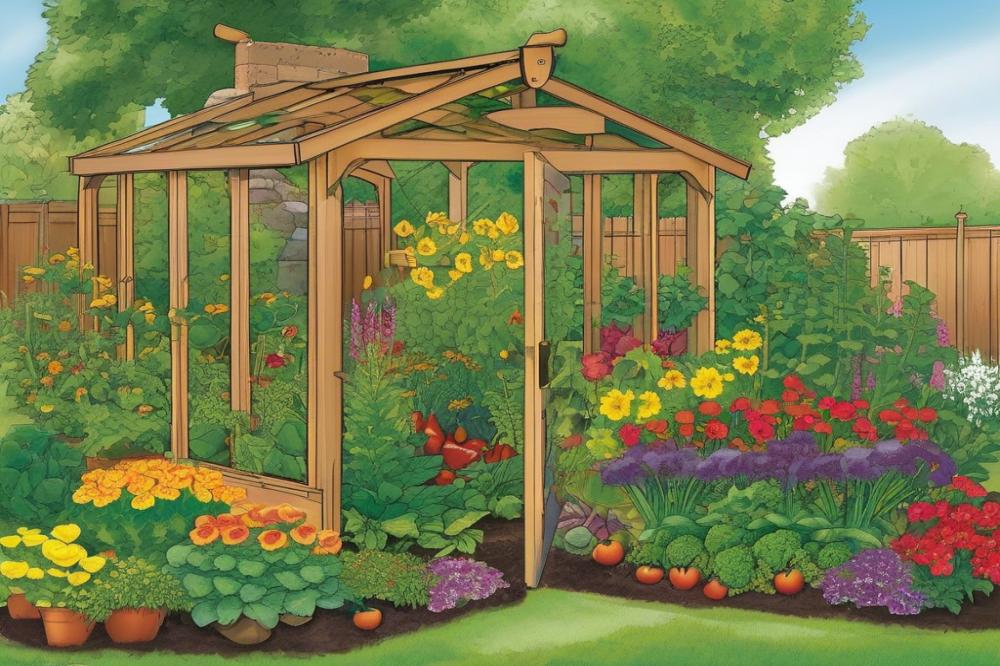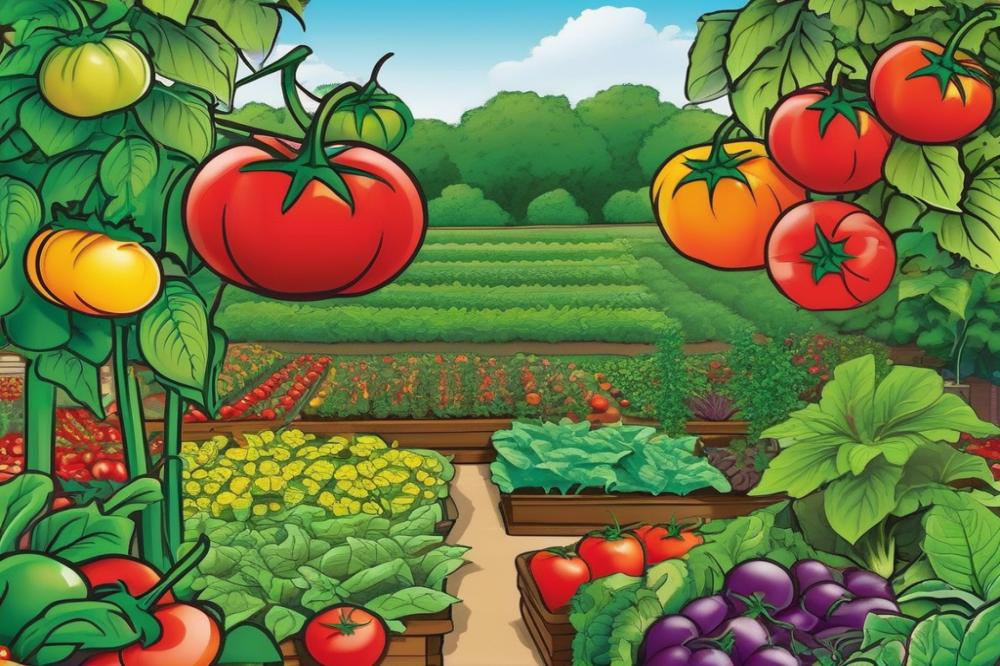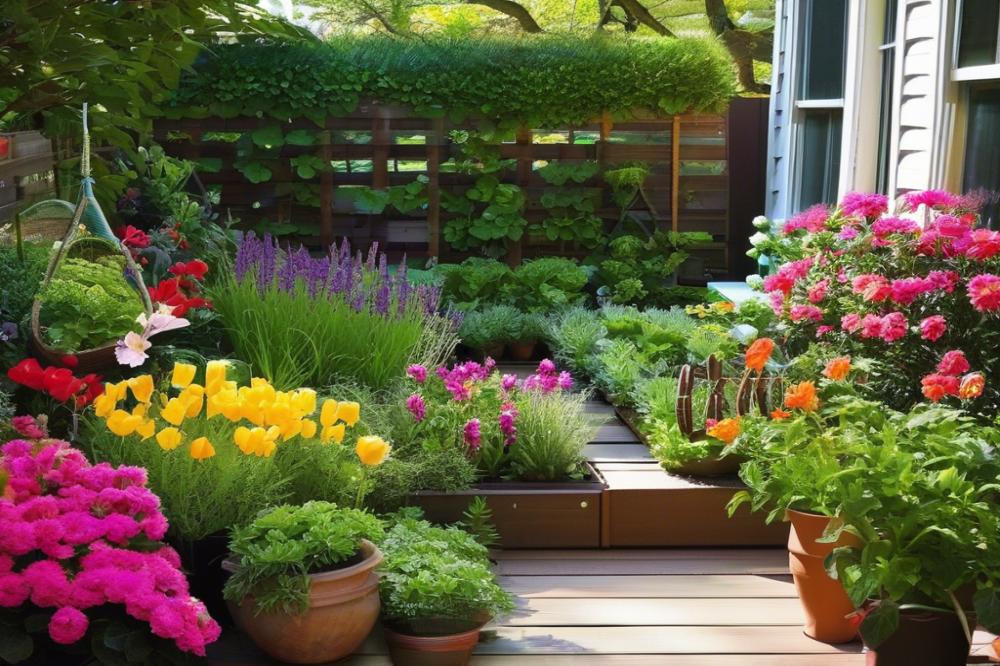Protecting Your Vegetable Garden from Pests Naturally
Pests can be a nightmare for anyone trying to grow vegetables. Harmful insects and diseases can destroy your hard work in an instant. vegetable garden protection is crucial for a bountiful harvest. Finding ways to keep your plants safe without harsh chemicals benefits both your garden and the environment.
There are several effective methods to fend off these invaders. Some of the most popular include organic pesticides, companion planting, and diatomaceous earth. These strategies not only help combat pests but also promote a healthier ecosystem in your garden. Many gardeners use neem oil and garlic spray to deter unwanted insects. Insect traps can catch harmful pests while leaving beneficial insects unharmed.
Crop rotation is a technique that keeps pests confused and less likely to return year after year. Physical barriers like row covers and nets protect plants from larger pests. Plus, using horticultural soap can smother unwanted insects on contact. Integrating these techniques allows you to manage pests naturally and effectively.
The goal of this article is to explore these natural pest control options in depth. By the end, you will have a better understanding of how to implement these strategies in your own garden. Enjoy the journey of creating a thriving vegetable garden that is safe from pests. Happy gardening!
Understanding Pests in Your Vegetable Garden


Common Pests That Affect Vegetable Plants
vegetable gardens often attract a variety of pests. Aphids, for example, are tiny insects that suck sap from plants, causing yellowing leaves. Cabbage worms can wreak havoc on kale and broccoli, devouring leaves in no time. Other offenders include slugs, beetles, and cutworms. Each pest has its favorites among vegetable species, making awareness vital. Recognizing these creatures early can save your harvest.
The Impact of Pests on Plant Health and Yield
Pests don’t just look unsightly; they can really harm your plants. Damage to leaves limits photosynthesis, causing stunted growth. Affected plants struggle to produce fruits and vegetables, leading to lower yields. Stress from pest attacks can also make plants more susceptible to diseases. This negative chain reaction can affect your entire garden. Keeping plants healthy is essential for a fruitful harvest.
Signs of Pest Infestations
Identifying the early signs of an infestation is crucial. Check for discolored or missing leaves, which could indicate pests feeding on them. Webbing between branches often points to spider mites. Sticky residue on leaves may suggest aphids have moved in. You might also see small holes in the foliage or presence of droppings on the soil. Regular inspections of your plants can prevent small problems from becoming big ones.
Steps You Can Take
Consider using organic pesticides like neem oil to address pest issues. companion planting helps too; planting marigolds with tomatoes can deter nematodes. Use diatomaceous earth to create a protective barrier around your plants. Insect traps can efficiently catch lurking pests. Beneficial insects, like ladybugs, are your allies in this battle. A simple garlic spray can repel common invaders. Crop rotation prevents pests from establishing themselves year after year. Physical barriers, such as row covers, can keep pests at bay. Horticultural soap also targets various insects and is safe for edible plants. Each of these options adds to your toolbox for protecting your garden.
natural pest control Methods


Natural pest control involves using techniques that do not rely on synthetic chemicals. These approaches help protect your plants while promoting a healthier garden environment. One significant benefit is that they minimize harmful residues on your vegetables. This means you can grow your food without worrying about chemical exposure. Additionally, many natural methods can boost the overall health of your garden.
When compared to chemical pesticides, natural methods are often safer for people, pets, and wildlife. Traditional pesticides can leave behind harmful residues that linger in the soil and air, affecting the entire ecosystem. On the other hand, organic pesticides derived from natural sources can target pests effectively without causing long-term damage. This approach improves soil health and encourages biodiversity.
Consider companion planting as a powerful strategy. Certain plants, when grown together, can repel pests or attract beneficial insects. For instance, marigolds can deter aphids and nematodes, creating a natural shield for vulnerable crops. Using neem oil is another option. This natural insecticide disrupts the life cycle of pests without eliminating good bugs.
Employing diatomaceous earth offers a unique method of control. This finely ground powder causes pests to dehydrate when they come into contact with it. You might also use insect traps to catch specific nuisances. These traps draw in unwanted visitors and help maintain pest populations at manageable levels.
Don’t forget the power of beneficial insects. Ladybugs and lacewings are natural predators to aphids and other pests. Introducing these helpful insects into your garden can significantly reduce pest populations without any harmful chemicals.
Garlic spray is another effective, easy-to-make solution. Its strong scent repels various pests, keeping your crops safe. Crop rotation remains a traditional yet effective practice for managing pest issues. Switching up your crops each season confuses pests and reduces their chances of establishing a stronghold in your garden.
Creating physical barriers can also protect your vegetables. Use row covers or nets to shield your plants from birds and larger insects. Horticultural soap helps control soft-bodied insects like aphids or spider mites. Regular spraying with this soap can keep those pests in check without harming beneficial creatures.
Utilizing Organic Pesticides


Organic pesticides are an effective way to protect your vegetable garden from pests without harming the environment. These products are derived from natural sources and help maintain the balance of your garden. When you choose organic options, you support healthy soil and promote biodiversity. This approach is safer for your family, pets, and beneficial insects that keep your garden thriving.
Specific Types of Organic Pesticides
Among the various organic pesticides, neem oil stands out for its powerful properties. Extracted from the seeds of the neem tree, it works by disrupting the life cycle of common garden pests. For instance, aphids and spider mites are no match for its effectiveness. Applying neem oil not only repels insects but also acts as a fungicide, protecting your plants from diseases.
Horticultural soap is another tool in your pest control arsenal. This soap suffocates soft-bodied insects like whiteflies and mealybugs. It’s easy to use and can be sprayed directly onto the affected areas. Both neem oil and horticultural soap provide a non-toxic solution to pest management. They are safer choices compared to synthetic chemicals. Furthermore, these organic pesticides can fit smoothly into your overall garden plan.
Application Tips and Effectiveness
When applying organic pesticides, timing is essential. Treat your plants during the early morning or late evening when beneficial insects are less active. Always follow label instructions for the best results. Keep a close eye on your plants after application. If pests return, you may need to reapply. Effective pest control often requires persistence and adaptation.
Consider integrating other natural techniques, such as companion planting. This method encourages plants to grow alongside others that can repel pests. Additionally, employ methods like crop rotation to keep diseases at bay. Insect traps can physically capture pests, while diatomaceous earth creates a barrier that insects avoid. All these practices work hand in hand to create a healthier garden ecosystem.
Using garlic spray is another organic approach that can deter various insects. Its strong scent drives away pests, and it’s easy to make at home. Simply blend garlic with water, strain it, and spray it on your plants. This method not only protects your crops but also adds a layer of security to your gardening efforts.
Don’t forget about physical barriers, like floating row covers, which can prevent insects from reaching your vegetables. By using these protective measures alongside organic pesticides, you significantly enhance your garden’s defenses. Together, these methods create a comprehensive strategy that supports healthy plant growth while effectively managing pests.
Companion Planting Strategies


Companion planting is a fantastic approach to protecting your vegetable garden naturally. This method involves growing different plants close together to enhance growth and deter pests. When chosen wisely, certain plants can help each other flourish while keeping harmful pests at bay.
For example, marigolds are famous for their ability to repel nematodes and aphids. Pairing them with tomatoes can lead to a healthier crop. Basil is another great companion. When planted near tomatoes, it can improve their flavor and deter flies and mosquitoes.
Other plant pairings can also have remarkable effects. Garlic, for instance, acts as a natural pest repellant. A simple garlic spray made from garlic bulbs can keep bugs away from your leafy greens. Similarly, planting onions around your cabbage can help fend off cabbage worms and other pests.
Companion plants also attract beneficial insects. Ladybugs, for instance, love to feast on aphids. When you plant flowers like dill and fennel, you draw these helpful bugs into your garden. They play a critical role in maintaining an organic balance in your outdoor space.
Crop rotation is another strategy that feeds into companion planting. Changing what you plant in a certain area each year prevents pest build-up and soil depletion. Combined with physical barriers like row covers, you can create a formidable defense against invaders.
The use of organic pesticides like neem oil or diatomaceous earth provides additional protection. Both are effective in controlling unwanted pests while being safe for the environment. Insect traps can also capture pests before they wreak havoc on your garden.
Utilizing horticultural soap can help smother pests on contact. It’s a gentle option that works wonders against spider mites and aphids. Combined with the strategic use of companion planting, these methods can transform your garden into a thriving, pest-resistant paradise.
Physical Barriers and Traps
Creating a safe space for your plants involves using physical barriers. Row covers are simple to use and effective. These lightweight fabrics act as shields against pests while still allowing sunlight and moisture through. They’re great for protecting seedlings and young plants from hungry creatures. In addition to row covers, consider using nets. They can be draped over your plants, serving as a protective layer against birds and larger insects. Make sure to secure the edges to avoid any uninvited guests.
Insect traps are another powerful tool in your battle against pests. Sticky traps can catch flying insects like aphids and whiteflies. You can place them around your garden to monitor the pest population. Furthermore, traps baited with attractants can help reduce the numbers of pests such as slugs or snails. Check your traps regularly and dispose of the caught pests. Maintaining this system can significantly reduce the need for more harmful methods.
Preventive measures bring many advantages to your gardening efforts. Physical barriers help protect valuable crops without the need for harsh chemicals. By using organic pesticides, you can minimize the impact on beneficial insects, such as ladybugs. Combining strategies like crop rotation and companion planting with barriers creates a well-rounded defense against pests. Techniques like using garlic spray or horticultural soap can boost the effectiveness of your barriers and traps.
Implementing diatomaceous earth offers extra protection as well. This natural powder disrupts the exoskeletons of insects, making it harder for them to thrive in your garden. When you create a layered approach, you’re not just defending your plants—you’re also creating an inviting environment for beneficial insects. Overall, by focusing on these physical barriers and traps, gardeners can enjoy lush, healthy plants while keeping pests at bay.
Incorporating Beneficial Insects
Beneficial insects play a crucial role in pest control. They can help keep harmful pests in check. Many gardeners appreciate these natural allies in the fight against unwanted guests.
Role of Beneficial Insects in Pest Control
Without beneficial insects, your vegetable garden may fall victim to destructive pests. These insects naturally feed on harmful bugs, reducing their numbers significantly. When you embrace these allies, you create a balanced ecosystem that thrives.
Examples of Beneficial Insects and Their Effects
Ladybugs are fantastic at munching on aphids. They can eat thousands of these pests in their lifetime. Lacewings, often called “aphid lions,” also provide excellent pest control. They feast on soft-bodied insects, helping protect your plants.
Another great example is the parasitic wasp. This tiny wasp lays eggs inside pest insects, leading to their demise. A well-chosen mix of beneficial insects can make a significant difference in your garden. For instance, hoverflies also help by laying larvae that feed on aphids.
How to Attract and Maintain Beneficial Insect Populations
Attracting beneficial insects can be simple and rewarding. Start by planting a variety of flowers that bloom at different times. Flowers like dill, fennel, and marigolds can entice many good bugs. Leave some areas of your garden a bit wild to offer natural habitats.
Companion planting is another great technique. Pairing certain plants together can create more biodiversity, making your garden more appealing to these helpful insects. You can also use organic pesticides sparingly, as they may harm beneficials too.
Consider using physical barriers, such as mesh or floating row covers, to protect your plants without harming helpful insects. Additionally, keeping your garden clean and free of debris will help promote a healthy environment. Horticultural soap can be an effective way to control pest populations while being gentle on your allies.
Don’t forget natural sprays like garlic spray or neem oil. They deter pests but usually won’t chase off beneficial insects. Regularly introduce new insects, especially after using diatomaceous earth or insect traps that catch pests effectively. Crop rotation can also be a smart strategy to keep your garden healthy and thriving.
Maintaining a healthy population of these beneficial insects requires regular observation. Watch for signs of pest outbreaks and make adjustments as necessary. Engage with your plants and the insects that visit them; this connection fosters a thriving ecosystem in your vegetable garden.
Natural Remedies and Homemade Solutions
Using natural remedies is crucial for anyone seeking to protect their vegetable garden. Organic solutions can be less harmful to the environment and safer for your family. They help maintain a healthy balance in your garden ecosystem. Rather than reaching for harsh chemicals, consider homemade options that are both effective and easy to create.
Recipes for Homemade Pest Deterrents
Creating your own pest deterrents can be a simple and rewarding experience. One popular choice is garlic spray. To make this, blend several garlic cloves with water. After straining it, add a few drops of liquid soap to help with adhesion. This mixture can repel many types of pests when sprayed directly onto your plants.
Another useful remedy is horticultural soap. Mix two tablespoons of liquid soap in a quart of water. This solution effectively targets soft-bodied insects like aphids. Just spray it on affected plants and watch those pests disappear!
The Power of Diatomaceous Earth
Diatomaceous earth is a remarkable substance for pest control. This powdery material is made from fossilized algae. When sprinkled around your plants, it acts as a physical barrier against insects. It damages the exoskeletons of pests, leading to dehydration and demise. Using it safely, you can protect your garden without resorting to harmful chemicals.
Additionally, diatomaceous earth can be applied alongside companion planting tactics. By planting defensive species among your vegetables, you can naturally discourage harmful insects. These methods, combined with diatomaceous earth, can greatly enhance the health of your garden.
Don’t forget about neem oil, which is another effective solution. It disrupts the life cycle of pests, preventing them from reproducing. Insect traps can also be a handy way to catch unwanted visitors. Beneficial insects like ladybugs can help keep harmful populations in check as well.
Utilizing crop rotation is important, too. Changing the locations of your plants each season can minimize pest problems. Physical barriers, like row covers, can protect your vegetables from direct contact with pests while allowing sunlight and moisture to reach them.
Staying engaged with these natural approaches will help you cultivate a thriving vegetable garden. Embracing various strategies leads to healthier plants and a more enjoyable gardening experience. You don’t need to rely on synthetic solutions when nature offers so many effective alternatives.
Crop Rotation Techniques
Crop rotation is a method where different types of crops are grown in the same area across seasons. This practice is vital for maintaining soil health and reducing pest infestations. By rotating crops, you can deplete the nutrients certain plants require while enriching the soil with others. It’s a straightforward way to boost productivity in your garden.
Understanding how this technique disrupts pest life cycles is key. Pests often thrive when they find their favorite food in predictable locations. When you change the types of plants you grow, you keep pests guessing. They may struggle to find their usual hosts, which can limit their numbers significantly.
Implementing effective crop rotation doesn’t require complicated steps. First, create a rotation plan that includes various families of plants. For example, after growing tomatoes, consider planting leafy greens or legumes. This variety promotes soil fertility while also confusing pests. Also, try grouping plants with similar needs together.
In combination with methods like companion planting, crop rotation can be even more effective. Companion planting involves placing beneficial plants near each other. This practice can attract helpful insects and repel those pests that threaten your harvest. Adding organic pesticides like neem oil or garlic spray can fortify this strategy, protecting your plants further.
Consider using physical barriers to enhance your crop rotation efforts. Row covers can shield young plants from insects, while diatomaceous earth provides a natural deterrent once pests do invade. Insect traps can also keep populations in check, ensuring that your plants remain safe.
Throughout the growing season, monitor the health of your plants and adjust your plan as needed. Beneficial insects, such as ladybugs or lacewings, may visit and help control harmful pests. If you notice a resurgence of unwanted insects, be ready to act with horticultural soap or other organic measures.
By using crop rotation techniques, you can create a resilient garden ecosystem. This practice not only protects your vegetables but also enriches your soil, resulting in vibrant, healthy plants. The more you rotate, the more your garden can benefit from the natural balance you establish.
Wrapping Up Your Journey to a Pest-Free Garden
In summary, protecting your vegetable garden from pests naturally involves a variety of strategies. You can start by incorporating methods like companion planting, which attracts beneficial insects that naturally keep harmful ones at bay. Creating a habitat for beneficial wildlife also works wonders. Introducing birds or ladybugs can significantly reduce pest populations in your garden. Using barriers such as row covers or nets can physically prevent pests from accessing your plants, giving them a fighting chance.
It’s time to embrace these methods and transform your garden into a vibrant, healthy space. Not only will this approach foster a lush environment for your vegetables, but it will also lower your reliance on synthetic chemicals. By using organic pesticides when necessary, you safeguard the health of your plants and the earth. Natural solutions allow you to work with nature instead of battling it, creating harmony in your garden.
Sustainable gardening practices do not just benefit you; they benefit the planet as well. The effects of choosing natural pest control extend beyond your garden, promoting biodiversity and soil health. Ultimately, every small action counts. Take pride in your efforts to cultivate a thriving vegetable garden while preserving the environment. You’re not just planting seeds; you’re nurturing a healthier world for future generations.



